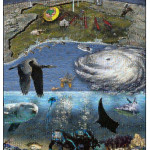
Welcome to our blog entry for the Carnival of the Blue on World Ocean Day, wherein we contemplate the question of the ocean as a glass half-empty or a glass half-full. Together, we see our modern culture as a blind man wandering down a forking path with a divining rod, flipping a Ying-Yang coin with a Devil on one shoulder and an Angel on the other. The blind man never knows what to do exactly, just to keep moving forward.
Deep Sea News looks forward before we step there, to examine two different paths through the ocean future. I will assume that mankind is basically evil, the ocean is doomed, and society as we know it will eventually crush itself under the weight of its own befuddled obesity. I don’t really believe people are evil so much as apathetic but the result is the same. Conversely, Peter will try to convince you that mankind is basically good, the ocean future is a bright one, and the genius entitled to humanity will eventually bring people together to manage our resources better. I assume doomsday, as is my nature, and Peter assumes, as is his nature, utopia.
Despite our overwhelming progress to rectify some of the human races past atrocities in the deep sea such as dumping of oil/gas structures, radioactive waste, nuclear reactors, munitions, and pharmaceutical waste, we are just going to make the same mistakes in new ways. Leap before we look. Here are my predictions for the oceans future but you can skip the specifics because the oceans and us are doomed. Can you say ecosystem collapse? It’s going to be real tough to be a deep-sea organism. A wonderful and extremely insightful paper by my colleagues Craig Smith and Adrian Glover, which was fodder for this post, provides a more thorough and fair treatment of the future of the deep ocean.

- Deep-Sea Fisheries: Our continued gluttony of fish flesh has lead to an exodus of fisheries to deeper water. We now consume deep-sea fish not previously on the market. In the future, the market and new technology will allow commercial fisheries to further exploit the deep sea. Unfortunately, the fish will not change much and still having low metabolic rates, low growth rates, low fecundity, and late reproduction making any fishery unsustainable. Several species are already at commercial extinction, e.g. pelagic armorhead and roundnose grenadier. On the upside in a few years when the current fisheries are gone, we will get to enjoy a whole new taste adventure as we begin to consume fish we wouldn’t dare eat now. Don’t forget your goverment will subsidize this this along the way. P.S. Say your goodbyes to sharks now.
- Collateral Damage By Trawling: Sure there is a current effort underway to ban bottom trawling. It is the cause-du-jour. All the fashionable countries are banning it and global ocean treaties galore are being signed left and right. Praise the day…the deep sea is saved! After the big street party in the future to pat ourselves on the back for all our hard work, we will come to a startling revelation. Not all countries have banned trawling. EU or UN resolutions help little for those countries not a part of either. Enforcement of international laws on the high seas is nonexistent or lax. The result is a loss of deep coral and sponge meadows, localized and potentially global extinction of many species, and overall loss of biodiversity.
- Deep-Sea Oil and Gas Drilling: Sure the Green Movement is making terrific advances in keeping people up through the night riddled with guilt about there gas consumption. In the future hybrids will be everywhere. You will not be able to throw an oilcan without hitting one. Unfortunately that same oilcan will bounce off and hit 5 SUVs. The SUVs of the future will be bigger than today only surpassed by our first-world egos. While some companies like BP will take action to explore alternative fuels, others will be more of the same. Tillerson, CEO of ExxonMobil, has reminded everyone, they are in the “business of finding, drilling, refining and selling oil and natural gas — not in the business of risking money to save the planet from bogeymen.” With a $20 billion a year investment for things like deep-sea oil platforms, the deep sea is going to be a little overcrowded. The Gulf of Mexico, North Sea, and pretty much everywhere else will be chock full of drilling muds and drill cuttings killing off most seafloor life. The upshot is all that “artificial reef”!
- Polymetiallic Nodule, Maganese Nodule, and Polymetallic Sulphide Mining: In the past the lack of financial incentive to overcome the technological feat of extracting minerals was enough to curtail mining operations in the deep. The financial incentive is quickly growing, and tomorrow looks even better if you own mining stock. If the lessons of past mining operations on land tells us anything, its get ready for a disaster. Companies like Nautilus Mining are working hard to convince us all that they can safely extract old hydrothermal vent chimneys with their bus-size ROVs and mining tailings will not affect local seafloor. But since I am the pessimistic one in this series, I am totally unconvinced. Direct plowing of the seafloor and vent mining will surely lead to a localized mortality among seafloor organisms. As mining becomes more profitable localized mortality will increase to regional and perhaps to global scales.
- CO2 Sequestration, Dumping of Sewage Sludge, Dumping of Dredge Spoil: As we Americans get ever larger, both in population and body size, our many fat asses our going to generate a lot of waste. Soccer moms are going to use more gasoline to carry all their fat little children around and generate more carbon dioxide. Our fat mouths are going to need increasingly more food, meaning both more fossil fuels to generate that food and fry it up. All that eating is going to generate a lot of…well you get the point. And we will all be convinced that the new plastic thingymabob from Asia is what we need to make our lives fulfilling. What is going to bring those thingymabob’s from Asia to our living rooms, superfreighters requiring deeper harbors and channels. Where is all this excess carbon dioxide, sludge, and spoil going to go. Out of site, out mind…into the deep sea.
- Global Warming and Ocean Acidification: I am so upset…I really don’t have the heart to go on. Lets just say that our current trajectory means undoubtedly a warmer and more acidic ocean. Warmth and acid are bad for organisms living in a basic and cold solution.






Well, as soon as we kill the oceans we will die. Then, presumably, other life (hopefully more intelligent then we) will evolve.
“you can skip the specifics because the oceans and us are doomed”
hilarious!
You are right, what was I thinking.